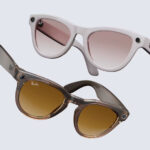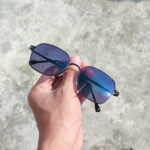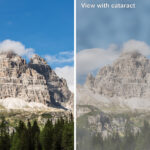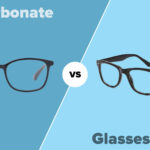
Winter, especially in the UK, is long, cold, and usually wet too. In the spring and summer, we’re accustomed to wearing sunglasses when it’s too bright and utilising polarised or transition lenses. But are you taking the same care of your eyes throughout the winter months?
For this blog, we’re looking at the 7 most common effects winter weather can have on your eye health and the measures you can take ensure your cold weather eyecare is effective.
1. Watery Eyes
Watery eyes, or excessive tearing, can be irritating at the best times, but they’re particularly troublesome when uninterrupted vision is required when driving, for example. As a result, hand-to-eye contact naturally increases. At a time when we’re trying to limit the transfer of bacteria, it’s not ideal to be continually wiping tears away.
One cause of watery eyes could be that you’re straining your eyes when the sun is low and directly in your eyeline. Furthermore, with icy conditions, sunlight tends to bounce off the glistening surfaces and shine directly into your line of sight. By investing in tinted or polarised lenses, you can limit the impact of the winter sun on your eyes.
Eye-watering can also be a common side-effect of the cold weather and is typical of seasonal allergies. Conducting your own process of elimination and trying over-the-counter treatments to alleviate your symptoms will help to determine if it is the cold or an allergy. If you find over-the-counter treatments are not effective, and the problem is persistent, seek medical advice.
2. Dryness and Irritation
Cold air, despite the feeling of dampness, doesn’t actually retain moisture and is very dry. This is why our skin becomes so dehydrated in the winter months! If you’re outside for extended periods such as a walk or working, or even inside on particularly cold days, cold weather can trigger dry eye syndrome through lack of moisture.
Raising your central heating to combat the cold can cause similar conditions, leading to eye rubbing, which in turn leaves eyes irritated. To remedy this, you can purchase eye drops for a range of dry-eye symptoms to provide comfort throughout the day. Where it is especially dry, try adding moisture to your environment with a humidifier or even a wet towel on a radiator.
3. Light Sensitivity
Typically, light sensitivity is more prevalent in snowy conditions. But on those bright, frosty days when we do see the sun, those with sensitive eyes are not so pleased to see it. We naturally become accustomed to the darker and somewhat gloomier backdrop of winter, so when the sun does appear, our eyes are not ready for it — resulting in you squinting and blinking more, leading to eye strain, headaches and watery eyes.
Much like we protect ourselves in the summer, it’s wise to have sunglasses, eye drops, and headache remedies on hand to quickly alleviate any sudden symptoms of eye sensitivity should we experience snow, bright conditions or reflective light. By investing in tinted or polarised lenses, you’re keeping your eyes protected from harmful UV rays and improving your vision for walking, driving and winter activities.
4. UV Damage
Along with light sensitivity comes UV damage. As we’ve said, we protect ourselves in the summer months without question, but UV rays are present and dangerous throughout the winter months, too. It’s not just when it is sunny either; much like you can still achieve a tan on a cloudy day, UV rays still come through in the winter months, particularly in snowy and frosty conditions.
If you go skiing, you will wear ski goggles or sunglasses to reflect the sun away and protect your eye health. Much of the same care applies in the UK, albeit the goggles may be a touch OTT! Should your eyes become sensitive to light, itchy, and red after being outside in bright or snowy conditions, then you may have sunburn on your eyes, also known as snow blindness. In this case, you should seek medical advice to reduce the chances of longer-term eye damage.
As a preventative measure, you should keep a pair of sunglasses, transitional lenses or polarised lenses nearby, especially in your car when the reflection of light can be both blinding and dangerous, to protect your eyes from further UV damage. For more information, read our blog, which discusses whether we should wear sunglasses in winter.
5. Snow Blindness
As we mentioned, snow blindness or Photokeratitis occurs when your eyes have been exposed to direct sunlight and burnt. This often happens outside in snowy or frosty conditions or if you spend a lot of time near smooth, icy surfaces such as water, which can reflect harmful UV rays into your eyes. Snow blindness causes dryness and irritation and is generally uncomfortable but should only last for a few days. Look into UV-protected lenses, such as tinted and mirrored effect finishes, as well as polarised lenses, which reflect the light. For prescription wearers, you can also go one step further and turn your ski goggles and running or cycling glasses into prescription lenses so you can keep up your favourite sport no matter the conditions.
6. Inflammation and redness
All of the above symptoms can lead to inflammation and redness of your eyes. You can often prevent inflammation and redness by treating these symptoms as soon as you notice them. Left alone, it can lead to even more eye troubles like discolouration, swollen eyelids, flakiness, tenderness, and redness. All of these are incredibly uncomfortable and an unnecessary evil of winter.
Much like excessive tearing, redness, and inflammation around your eyes can also be symptomatic of seasonal allergies. If needed, speak to a pharmacist and stock up on treatments such as eyedrops to heal your eyes. During this time, protect your eyes from bright conditions and dryness with UV protection sunglasses.
7. Inflammation and redness
Any changes in vision should not be ignored, come rain or shine. Cold weather, for those with sensitive eyes, can deliver short-term blurriness when stepping outside from a warm place, for instance, but should not last long or reoccur. This could result from the difference in temperature, in which case, head back into the warm! But the change in light can also have a knock-on effect. Transitional lenses can help overcome this problem, as the lenses naturally adapt to the amount of light available. They’ll remain clear in dark settings to allow light in and transition to darker lenses to protect your eyes from strengthening light.
Cold Weather Eyecare Tips This Winter
Winter can be bleak but often so beautiful, too. Caring for your eyes should be a year-round endeavour, but with the colder months having the most brutal shift of seasonal changes, we recommend taking these steps to ensure you enjoy the brighter days and frosty nights with clarity and comfort.
- Wear sunglasses with UV protection when outside
- Choose polarised lenses to block blinding glare
- Keep your eyes hydrated with drops if required
- Avoid turning your central heating up too high
- Check for winter eye symptoms and treat them straight away
- Speak to a medical professional if symptoms persist
Why Use Lensology?
At Lensology, we are experts in cold weather eyecare and eyecare in general. We supply the highest quality lenses for your frames, saving up to 70% on high street prices. Speak to our friendly experts today for advice and more information on our range of lenses to suit you. Ready to reglaze your glasses? Simply request a free pack here to send us your frames.







